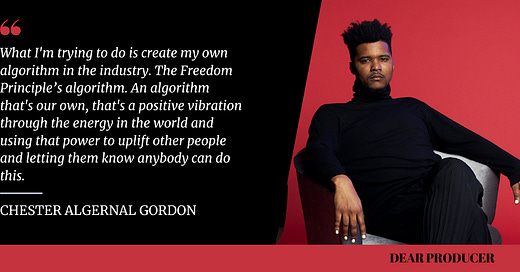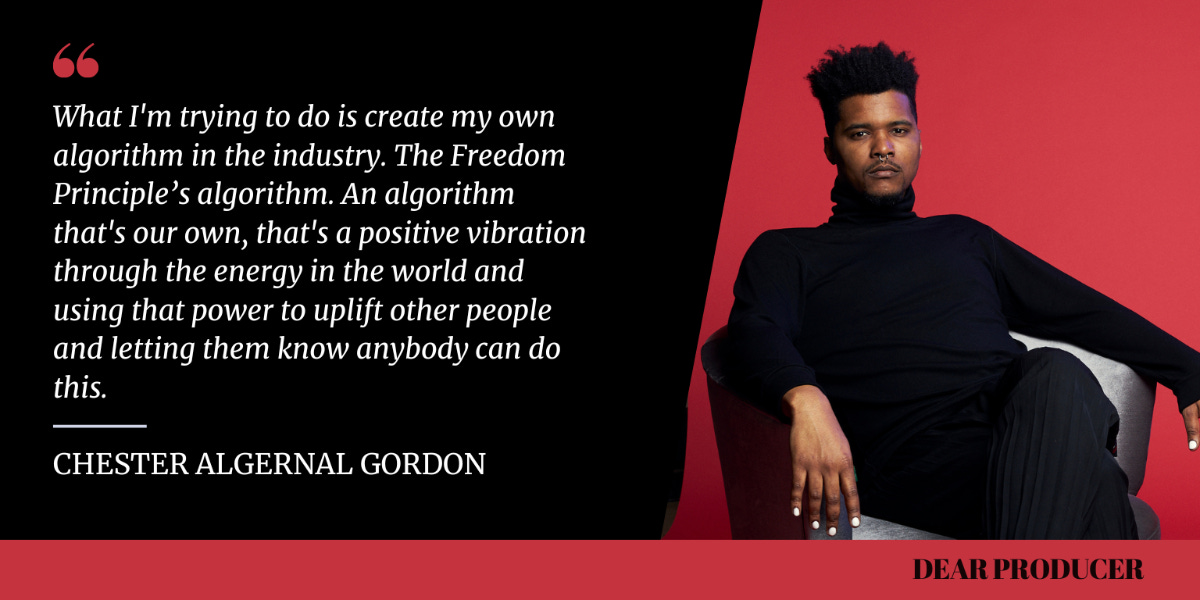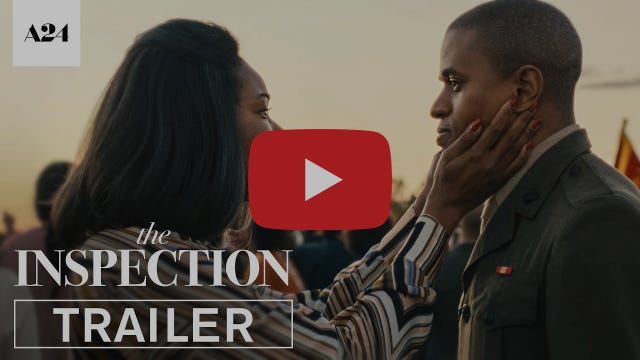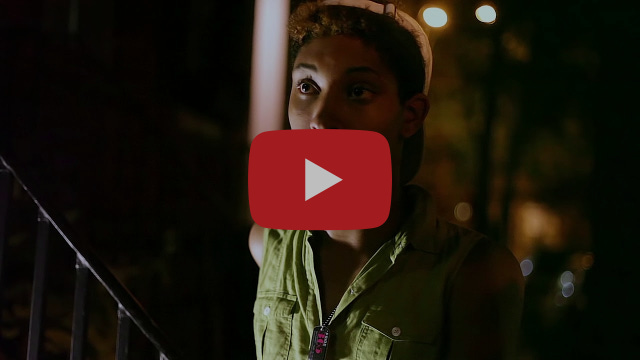Chester Algernal Gordon is a costume designer turned producer based in NYC who has produced a fleet of acclaimed short films and the documentary film PIER KIDS, which won an Independent Spirit Award in 2019. As a 2019 Film Independent Producing Lab and Fast Track Lab fellow, they had the opportunity to workshop their first narrative feature, THE INSPECTION, which recently enjoyed a global premiere at the 47th Toronto International Film Festival with distribution by A24 and is nominated for three Film Independent Spirit Awards.
Dear Producer sat down with Gordon to discuss their transition from costume designing to producing, what their journey was like taking a film from a lab to a global premiere, and how to build a sustainable producing career alongside their long-time collaborator and spouse, director Elegance Bratton.
You and I first met at the Film Independent Producing Lab in 2019 where you workshopped THE INSPECTION. Can you tell us about your journey from a lab to then having a world premiere at the Toronto International Film Festival?
One of the hardest parts of making this movie was putting together the script. We knew that a strong script attracts great talent, which then gets you into conversations with studios. A lot of the labs are for tracking projects, meeting agents and managers; somebody who will hear your pitch, and essentially, want to do something about it. We needed that momentum.
Before the Film Independent Producing Lab, I’d done narrative shorts and produced a documentary feature for $150,000, but THE INSPECTION called for at least $3mil, and putting together a $3mil movie is completely different than $150,000. Most filmmakers don’t get that kind of money to make their first feature so the first thing we’d get told by mentors is that the script is too ambitious. It would cost way more than what a first-time filmmaker typically can raise, which makes sense. Most financiers won’t put that much money and trust into people without seeing that they’ve done it successfully on a previous film.
Before the Producing Lab, I’d never had a mentor go through every step of putting a movie together from beginning to end. After doing the Producing Lab, I understood how to put together the movie much more clearly. I also understood that the script needed more flow. Film Independent gave us some of the best notes on the script. A month after we got out of the Producing Lab, we had a new draft we were proud of, it finally had a feeling to it. It felt like it was buzzing.
Everything started to move much quicker after that. I had met Effie Brown a year previous to doing the Producing Lab. We had flown out to the LA Gala and I walked up to Effie and said, “I have this movie I want to make, and blah, blah, blah.” She was like, “Let me take a photo with you.” [laughs]. She took a photo and tagged me in it on Facebook.
As it goes in this business.
As it goes, everybody pitches you at a party, and you’re like, okay. [laughs] Honestly, after we did the Producing Lab, and we got the script together, we started sending it out again and taking meetings again, and we did the Film Independent Fast Track program right after the Producing Lab, and did really well with pitching. I think we had 60 meetings and that created a little buzz. Some of the meetings were with people who were friends with Effie and they called her to tell her about the project and that she should get involved. A few companies were really interested in the project and ultimately we went with A24 because Zach Vargas-Sullivan, an executive at A24 who Elegance went to college with, had been giving notes on every draft of the script because he really cared about the story.
Once we decided to go with A24, and once Effie was on board, it was green-lit. Effie wasn’t just producing either, she decided to put her money where her mouth was and her company Gamechanger Films co-financed with A24, which moved the needle a lot. When somebody gives you $1.5mil and says, “Let’s go.” It’s a dream partnership.
Speaking of partnerships, you’re married to the director of THE INSPECTION, Elegance Bratton. How was the experience of working with your partner?
Elegance is my main collaborator in life so we’ve had practice building up to this feature together. We certainly have passionate debates about things, but honestly, it’s one of those things where I don’t know if anybody pushes me as Elegance pushes me, and I don’t know if anybody pushes Elegance the way that I push him. We have a rule, in and out of work, to be honest and to have clear communication. If you don’t, no matter what kind of relationship you’re looking at, it gets muddy, and feelings get hurt. I think this love we have for each other essentially made it all happen. I really believed in him and his story.
I think about when we sat on the couch on our broken down sofa that our cat ripped up and he said to me, “I need to write a feature.” It was between two feature ideas, one based on a previous short of his or one based on his life. I told him I thought he should do the one that’s personal because only he could tell that story.
There’s been a lot of gay Marines that have gone through the Marine Corps, but the thing that makes his story so special is that the same experience that he’s gone through as a gay man, a woman’s gone through the Marine Corps in her own way, or a Muslim person has gone through in their own way. When you’re the minority in a hyper-masculine place, you stick out like a sore thumb. The Marines are the first ones to come in anytime we go to war. These are some of the strongest, fastest, and smartest in the military.
I’ve met a couple of people that Elegance served with and have seen their brotherhood and how they really support each other, no matter what their beliefs. Elegance has Republican friends that he’s served with. Republican straight white men from Virginia in the middle of the country. They’re incredible. We visit and stay with them and their families and I listen to them reminisce about the times that they served together in the Corps. To witness that unbreakable bond, you have to tell that story. You have to talk about that bond. You have to talk about how that bond was created and how that bond changed your life and how you chose yourself.
No matter what, everybody should choose themselves because if you don’t choose yourself, how can you help anybody? How can you do anything without pulling yourself up by your bootstraps? I think he did that. This is his story as only he can write it.
A $3mil budget sounds like a lot, but gets spent fast. With only 19 shoot days, where did the money go?
COVID shut us down for four months. It was nerve-wracking because you start asking yourself if everyone will even be available again. What’s even possible? We only got a five-day pickup after the shutdown and that’s where the money went. We also got a second camera crew so we could shoot more at once for two of the pick-up days
You talked about the importance of momentum, how do you get that back in production once you’ve shut down for four months? Did you feel everybody was raring to go again or was there a shift in tone on set?
Honestly, it was seamless. Elegance is an amazing leader. We made sure that everybody on the crew felt special. We spoke to them and gave them our time. I come from costumes and know how little I ever got to talk with my directors about what they really wanted. In doing prep for this movie, I set that time aside for him to meet with everyone and then held him accountable for making it happen. He also held himself accountable and was a wonderful leader every day.
People would thank him regularly for writing his story and for how he was on set. Most of the time we filmed it was very emotional because right before we got green-lit, Elegance’s mother died. Everyone knew Elegance was healing in this process. It was beautiful because the crew really held him.
Our crew was emotionally intelligent and they honored his process. Honestly, he showed them the entire time that he valued them. That’s what happened. All of them came back. Before we even told our crew when we were shooting, they would reach out every month to see when we were coming back to make sure that they were available to finish this movie. I know directors who shot during COVID and couldn’t get any of their group back when it was time. We were very fortunate.
Can you talk about the transition you made from being a costume designer to producing?
I did costumes on maybe six features and a bunch of shorts and then I started producing shorts, but I hadn’t taken the full leap. I produced maybe 30 shorts and a short I produced -SHIP: A VISUAL POEM won Short Film Jury Prize for U.S. Fiction at the 2020 Sundance Film Festival. Elegance and I always talk about how we believe everybody is a director of their department. Producers are directors in their own right because they’re hiring everybody. The costume designer is directing the costumes of the entire movie. They’re telling their own story that should be as great as the story that’s on the script, but visually through the costumes, production design, all of it, even sound.
In leaning into that idea, when Elegance started doing his first short WALK FOR ME, a lot of people at his school didn’t understand the stories he wanted to tell because they were different. No one raised their hands to produce for him at his school. I raised my hands and put on some boots, pulled them up, and got in there to start producing.
I used to be a visual merchandiser for American Apparel and oversaw the district’s visuals, which is not far from producing. There are so many different jobs you can have that feed into being a producer, but being a producer is also so specific. I feel like the producer’s biggest job is putting together the movie and actually seeing it through to the end [laughs] because of everything that can possibly happen during each period of making a film, not everyone sticks it out. Protecting the creation of the film, essentially, is the job.
What was it about your producing experiences that gave you that feeling that you should stay in this role and not go back to costumes?
Honestly, I love facilitating people’s visions and adding to them. I think that I’m a very creative person and I feel like I can make any idea my own or become a part of an idea, if that makes sense. That’s one of my rules, to only get involved with things I can make better. I think that the directors who started coming to me to produce after I did WALK FOR ME, I loved all their stories. M.G. Evangelista, Jovan James, Terrance Daye, all of them.
I love the creative process and talking through things with directors, trying to figure out how to make it real. How to take something from your head and brainstorm how to make it visual, I love that process. That’s what made me want to continue to produce because I get to be involved from the ground up and help make these visions come true.
After the kind of success you’ve had with THE INSPECTION, it’s often tricky for producers to navigate their future relationship with the director. In your case, not only are you work partners, but you are life partners, making it even more tricky. How do you and Elegance plan to grow together as filmmakers?
It is very tricky. We started a company together, Freedom Principle, with the first credit being PIER KIDS and then our second credit is THE INSPECTION. We’re currently negotiating deals for our next film. We are moving forward together and have decided to work together on everything. I’m very protective of Elegance’s vision because I really do understand where he wants to go. Again, the thing I enjoy about being a producer is that there’s so much joy in seeing someone’s dreams come true in front of them. Not only do their dreams come true, but their dreams inspire others to dream.
I can’t tell you how many people have come to me after seeing PIER KIDS or WALK FOR ME or even THE INSPECTION. Not just Black gay people or trans people, but straight white men–they understand the “other” in a new way because of the perspective that’s been shown them. They can now see the humanity in those people, which makes them want to do better and be better.
A director’s trajectory after a successful film is much more clear cut than a producer’s journey and producers are often left behind when their director goes on to a bigger film. How will you take your experience with THE INSPECTION and turn it into opportunities for yourself?
I’m thinking about the work that I want to do next. I’m thinking about the directors I want to work with. I’m thinking about the producers who I want to collaborate with. I’m thinking about expanding our community. The one thing I appreciate about the film industry, and meeting you, is at first I didn’t understand how the film industry worked. I can be very intuitive, but feelings are not facts. Facts are facts. I want to expand and I want to collaborate and build our community out.
I’m still learning, too. I want to work with producers who are more accomplished than me and I want to work with producers who are not as accomplished as me. I want to work with directors who are new voices, who really need that development help to cultivate their voice, and help younger producers who are coming up create more sustainable careers. I also want to help producers and directors build more solid relationships with each other so they understand that you can grow together.
On bigger budget films you can have 10 or 15 producers on a project. You don’t have to leave your person behind because you are peer pressured into doing so. You can move forward like a true partnership. It’s okay to say no to things, too. Also, not everything is for us so thinking about saying, “This is not for us, but you know who would be perfect for this?…” Be generous and kind and think about who’s actually best for things. This means not just focusing on volume but on projects that really help bridge the left and the right in our country, that literally create sustainable change. That’s my new word: sustainability. So much is not sustainable.
I think what happens is there’s very much a scarcity mindset in this business and a fear that opportunities will go away. People hoard projects and relationships rather than recommend others like you are suggesting. On one hand, I get it, but on the other, I just don’t feel like it’s a good way to go about life. We need to lift each other up.
Changing topic… How did you get Animal Collective involved in THE INSPECTION?
I think Animal Collective is an incredible band and feel like they’re so ahead of their time with their sound.
I always remember everything Elegance talks about. [laughs] It randomly comes up to the surface sometimes almost like boiling water. When we shut down for COVID, we had to start deciding what the soundtrack was going to sound like. I said to Elegance, “When you were in Hawaii, you loved to interview indie bands. Why not get one of those bands to do this soundtrack?”
During the pandemic, we purchased a house in Baltimore and Animal Collective is from Baltimore so I’m like, “Would it be crazy if we got Animal Collective to do the soundtrack?” Elegance and I then loop Effie in so it’s all three of us on the same page. Everything culminates and boils down between the three of us and then we will go to the wider team. We were like, “This is a good idea. Let’s just do it.” We reached out to the band to set a meeting and they watched the first cut of the film. Everything wasn’t even in the cut, but they were moved and wanted to figure out how to make it work.
I remember the first track they put into the movie. It was during the scene where French is working out, their physical fitness training. Their music elevated the movie. I fell in love with them all over again. It was really a collective decision between me and Elegance, but mostly his idea because again, he loves indie rock. I knew he loved Animal Collective. I know the respect he has for them and what he thinks of them. I just reminded him of an idea that he’d already had.
As a good producer does…
You’re in a really high moment with your film, but regardless, I do think you have a more positive outlook than most producers I’ve talked to recently. I’m just curious what your take is on the next few years of independent film? There are huge struggles in putting any movie together right now. How are you feeling and do you have a mantra or a motto that you’re keeping in your head to keep going?
Honestly, I feel like I’ve decided to do this. It’s one of those things where I’ve just decided to commit myself to this process and see where I land. I do look around at the industry and see how fast it’s changing. The scale is becoming higher and people want to be entertained more. It feels like we’re losing the drama a little bit. Every resource is being put into action films. Honestly, I tell every director, “This is the time to really write the things that are personal to you because what’s personal to you moves people.”
This is a time to write those stories that we’ve been missing, to write those stories that will really change the world and make it better in the next 20 years for the future. This is the time to do that. I’m thinking, “How do I find people with stories, like Elegance, who only they can tell those stories?” I am really behind people like that. I do love a big movie, don’t get it twisted. LORD OF THE RINGS is why I got into filmmaking. It wasn’t some small indie film that made me want to make movies. LORD OF THE RINGS is my film. I love the hero’s journey, the underdog. THE INSPECTION is not on the same scale at all, but he goes through his own journey. I’m just interested in personal hero journeys. I’m interested in that because I know the world is interested in it, too.
We keep trying to go by algorithms. I guess what I’m trying to do is create my own algorithm in the industry. The Freedom Principle’s algorithm. That’s the name of our production company, but really create an algorithm that’s our own, that’s a positive vibration through the energy in the world and using that power to uplift other people and letting them know anybody can do this.
The greatest advice you’ve given me Rebecca is, ‘Every day, you have to do something for the movie.’ Every day, even if it’s one email you send, just one, you have to do something to keep the project moving. Honestly, it’s true. If you send an email every day, eventually it will come together. If you start getting your script together and putting that work in and not being so precious about the notes you’re getting and actually try to apply notes to see if it’s working, or see if it’s not working – it’s all about openness, collaboration, and kindness.
Angela Lee at Film Independent says, ‘Kindness is free. It’s easy. It’s not stressful at all.’ I feel like that’s my advice, that’s my motto. I’ve been working like that and I can’t tell you how many doors it opened for me. I literally have just been kind and stopped taking anything personally. I’ve learned that. I used to take everything personally and I’ve learned not to because everybody’s going through something. You may not be privy to what they’re going through, or understand it completely, but they’re going through it and it’s not what you’re going through. Just being conscious of that, I think that’s what you have to do to succeed.
THE INSPECTION is now playing in theaters.
If you are enjoying and benefiting from the stories we are publishing, please consider making a donation to ensure that we can continue to provide free resources for filmmakers and amplify the voices of producers.







